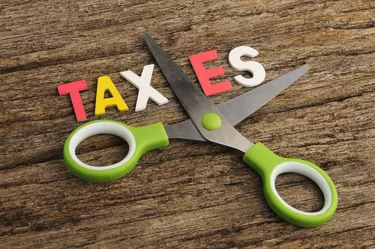
Someone needs to fund federal government programs. The question is who should bear that burden? Some say the tax rates for the rich should far exceed that of the poor. Others say certain behaviors of the rich are rightly rewarded by their tax breaks. Still others believe the federal tax policy says a great deal about who the American people are in a cultural sense.
It's likely, however, that all tax payers have a stake in the decisions that Congress and the president make in regard to what citizens and organizational entities are exempt from paying federal income taxes.
Video of the Day
Video of the Day
Tax Loopholes and Tax Breaks
One practical way to lower federal and state taxes without cutting spending is to broaden the tax base, or that portion of income subject to taxation. The larger the income pool that's taxed, the lower the tax rate can be to raise the same amount of revenue. The reason being that the more narrow the tax base, the more inefficient and non-neutral the federal taxation process, the lower the tax administration costs, and the greater the revenue generated for the government at lower tax rates.
This effort, however, is countered by provisions in the federal tax code that allow taxpayers to decrease their tax liability. Tax loopholes include the mortgage interest deduction, lifetime learning credit and the child tax credit.
US Tax Code and Tax Exemptions
U.S. tax law grants certain tax exemptions, which allow some tax payers the right to exclude certain income from federal taxation thereby reducing their taxable income in whole or in part. These individuals or entities can be grouped into five taxpayer categories.
Low-Income Taxpayers
Taxpayers who earn an income that's less than the standard deduction neither file a tax return nor pay taxes. For the tax year 2022, $12,950 is the standard deduction for a single filer and a married person who files separately. The standard deduction for those who file jointly is $25,900 and $19,400 for filing as head of household.
Not-for-Profit Organizations
Internal Revenue Code Section 501(c)3 declares that if an entity qualifies as a not-for-profit organization, it is exempt from paying any income taxes. Religious, educational and humanitarian entities, including churches, synagogues, universities, hospitals, the Red Cross, homeless shelters and other groups whose mission is to improve society, qualify as not-for-profit organizations.
Read more: How to Verify a Tax-Exempt Organization With the IRS
Taxpayers in Foreign Countries
An expatriate is a U.S. taxpayer who resides in a foreign country or who is physically present in a foreign country for 330 full days or more a year. As such, that taxpayer may qualify for the foreign earned income exclusion, the foreign housing exclusion, and/or the foreign housing deduction. In this situation, the income earned during that period may not be subject to U.S. federal taxes.
For the tax year 2021, as much as $108,700 of an American's foreign earnings may be excluded from the income reported on the taxpayers U.S. federal income tax return. For 2022, that excluded income increases to $112,000. In addition, an expatriate may exclude from income the value of meals and lodging an employer provides on its premises for its own convenience.
Taxpayer With Multiple Deductions
U.S. taxpayers can claim a standard deduction to reduce taxable income, as well as claim an additional deduction if the taxpayer is over 65 years of age and/or blind. For the tax year 2021, there is no limit on itemized deductions.
Consequently, personal deductions may allow a taxpayer to write off all or most taxable income. For instance, a taxpayer may claim a substantial medical bill as an medical expense, assuming it's not been reimbursed.
Read more: What Does Tax Exempt Mean?
Taxpayer With Multiple Dependents
A low-income family that qualifies for the Earned Income Tax Credit may reduce the federal taxes it pays or be eligible for a refund. For instance, a couple with two children that files a joint return may qualify for a tax credit of up to $5,980 in the 2021 tax year. The tax credit offsets the couple's tax bill dollar for dollar.